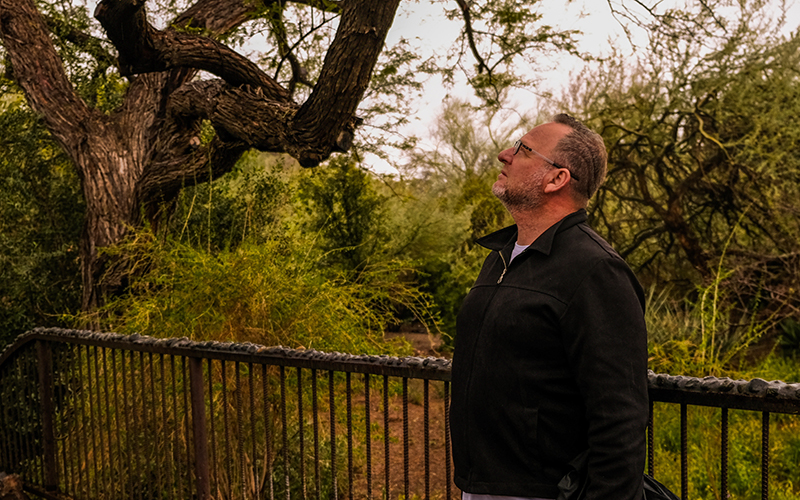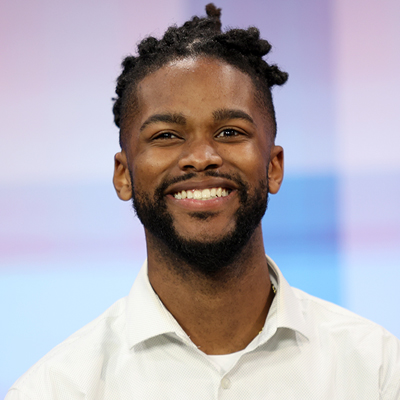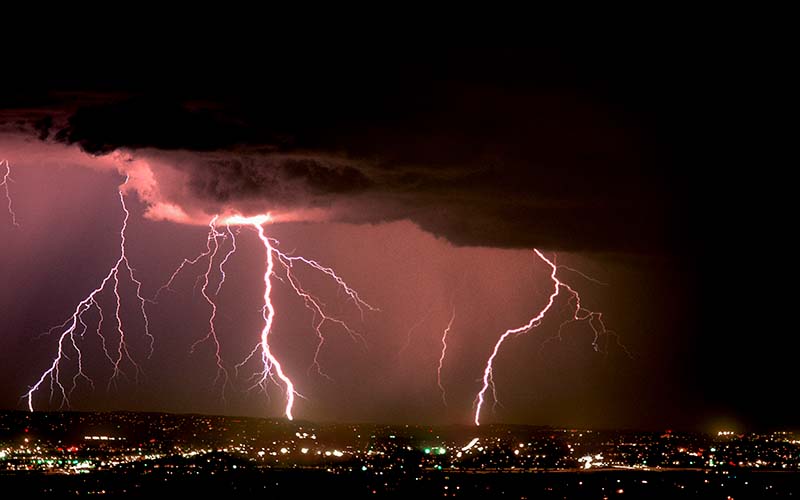
The impact of climate change on the sports world could be dramatic. Here, lightning strikes over Tucson light up the sky. (Photo by Wild Horizons/Universal Images Group via Getty Images)
PHOENIX – Over the next few decades the planet will continue to see the impact of climate change, and the sports world is no exception. Experts predict violent storms will cause destruction to sports venues and infrastructure. Coastal erosion and rising sea levels will directly affect sports properties in or near the ocean. High temperatures will create a substandard fan experience, pose potential health risks, and force scheduling changes to sporting events. Warmer winters and lack of natural snow will threaten ski resorts at lower altitudes.
The sports industry has already begun to experience these effects.
The above-normal 61 degrees Fahrenheit in Sochi, Russia, during the 2014 Winter Olympic Games created poor snow conditions that contributed to delays, injuries, and athlete complaints on many events like the men’s snowboard halfpipe competition, the women’s ski jump, and men’s downhill.
In July 2016, historic flooding in West Virginia engulfed an entire golf course on which the Professional Golf Association Tour’s Greenbrier Classic was annually contested, causing the tournament not to be played that year.
In 2019, the Rugby World Cup, hosted in Japan, was disrupted by unprecedented pacific typhoons.
At the 2020 Australian Open, the first tennis major of the year, the peak temperature of 108 degrees Fahrenheit coupled with hot winds blowing wildfire smoke resulted in multiple athletes fainting and vomiting.
The 2022 FIFA World Cup was postponed to November and December because of Qatar’s intense summer heat. It will be the first time the event is not played in May, June or July.
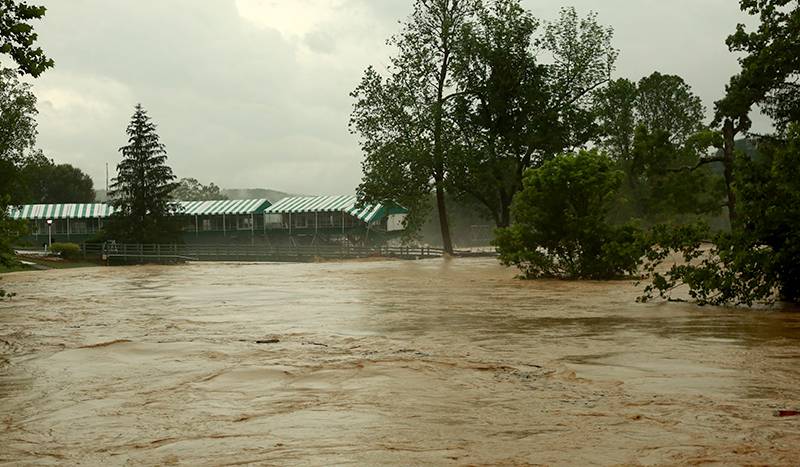
In 2016, historic flooding in West Virginia caused the PGA Tour’s Greenbrier Classic to be canceled. (Photo courtesy of The Greenbrier)
Sport is part of the problem
If the sports world is to make its own contribution to climate change action, it first needs to acknowledge and accept its own role in the problem.
“Over the time that I’ve been writing Green Sports Blog,” EcoAthletes founder Lew Blaustein said, “I found that the sports world at large was not, especially in the early days like 2013, 2014, 2015, 2016, 2017, and maybe even 2018, really touching on climate change.”
A report by Waste Management, a Houston-based commercial garbage and recycling company that is also the Phoenix Open’s title sponsor, estimates that the NFL, MLB, NBA, and NHL generate about 35,000 tons of carbon dioxide each year from their fans.
In Arizona, signs of growing awareness are everywhere.
In a 2020 Sustainability Report, the Phoenix Open calculated that the tournament emitted 1,128 metric tons of carbon dioxide equivalent, all of which was offset. It also noted that 100% of tournament materials were diverted from landfills, 100% renewable electricity was purchased and 50 million gallons of water were restored to the Verde River Valley.
Additionally, the partnership between the Phoenix Suns and Mercury with Footprint in an arena naming-rights deal promotes reducing the carbon footprint and amount of waste produced by large-scale sporting events
Plenty of work remains.
The 2016 Summer Olympics in Rio de Janeiro, Brazil, produced 4.5 million tons of carbon dioxide, according to a 2016 Rio Olympics report.
Large contributors to carbon emissions in the sports industry are travel, by athletes and fans alike, in-stadium food and beverage and infrastructure of stadiums and arenas.
Jacquie Pierri, a New Jersey-reared, Brown-educated, European Women’s Hockey League player, had a fear of being called a hypocrite when first embarking on her climate change journey.
“Here I am, an athlete that plays a really energy-intensive sport,” Pierri said. “I fly all over the world to play hockey. I think the way that we go about messaging has to be really careful not to come across as preachy.”
Pierri, 31, who earned a double master’s degree in sustainable energy systems and innovation, didn’t let her fear stand in the way of spreading awareness for what she believes in and inspiring others.
“There’s a paralysis that comes with how small of an individual impact we each have and it’s really hard to see the bigger picture of how those individual efforts can compound into greater change,” Pierri said.
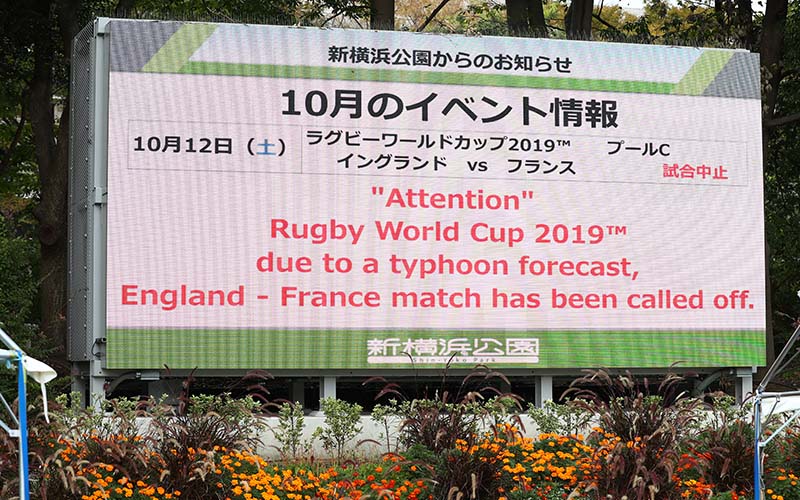
In 2019, Typhoon Hagibis disrupted the Rugby World Cup in Yokohama, Japan. (Photo by Stu Forster/Getty Images)
Athlete intervention
With the impending consequences of climate change continuing to threaten their livelihoods, athletes around the country have come together to advocate for more environmentally-forward everyday practices within their own locker rooms and around the globe.
OL Reign strives to be the club in the National Women’s Soccer League with the best energy sustainability. Currently, the athletes practice numerous environmentally-conscious habits within the locker room and in their own everyday lives.
“I initially saw all the plastic being used (in the locker room) and knew it could be avoidable,” OL Reign defender Lauren Barnes said. “So we’ve gone from plastic to Everybody Water, which is a container made from paper with a cap made of sugar cane so it can be 100% recyclable.”
OL Reign no longer purchases food wrapped in single-use plastic and opts for utilizing reusable containers instead. Paper towels in the bathroom have been replaced with reusable wash towels and laundry isn’t run every day. Postgame meals are served with reusable utensils. Shampoo, conditioner and body wash is bought in bulk and is refilled from a local company in Tacoma.
“You can imagine, 32 girls in a locker room, just how much we wash our hair,” Barnes said, chuckling. “So we were going through a lot of plastic just through the shampoo and conditioner bottles.”
Integrating these seemingly small sustainable practices into locker room etiquette has educated the players to the extent that they now choose the more sustainable route when presented with the option.
“That simple fix is just like a domino effect,” Barnes said. “Now more sports, whether it’s our league or outside our league, those initiatives are recycling between teams.”
The tight-knit professional sports community in the Pacific Northwest follows in the footsteps of OL Reign’s sustainable initiatives. The Seattle Seahawks, Seattle Sounders FC and the new Seattle Kraken also participate in the elimination of single-use plastics.
Barnes is a new member of Players For The Planet (PFTP), an organization that works to connect professional athletes, sports teams and organizations with actionable opportunities to serve and protect the natural world and the environment.
Former MLB player Chris Dickerson founded PFTP in 2009 to unite professional athletes in creating positive change within the environment. The ultimate goal of the organization is to support the professional sports industry in becoming a leader in ecologically conscious, environmentally responsible and sustainable practices worldwide.
PFTP is a growing global movement, with 75 athletes championing its cause. Some notable ambassadors, other than Barnes, include the baseball pitchers Tyler Glasnow and Miguel Castro, the baseball outfielder Jon Jay and the rugby player Nicole Heavirland. Ambassadors fuel their individual passions by focusing their efforts on plastics elimination, recycling initiatives, the promotion of reusable and repurposable materials and conservation efforts.
Although many professional athletes are taking crucial steps toward a more environmentally conscious lifestyle, most still fear addressing or acknowledging climate change itself, for reasons varying from lack of education about the topic to concerns about tackling a politically divisive issue.
EcoAthletes, founded by Blaustein in April 2020, is centered around educating their affiliated athletes, coined EcoAthletes Champions, on climate change.
According to Blaustein, the “special sauce” of EcoAthletes is its Resource Hub designed to aid its ambassadors anywhere on the climate spectrum (climate-curious, climate-aware, climate-active) to achieve the status of a “climate leader.”
Of the many resources EcoAthletes offers its ambassadors, one is customized social media content that helps athletes find and share their “climate voice” and personal, passionate brand. This allows them to feel more comfortable speaking about climate change on their public platforms.
“If the Yankees do a great recycling or composting program at Yankee Stadium, that’s cool, but I don’t think it’s going to change as many minds as an athlete,” Blaustein said. “You know if Aaron Judge of the Yankees went out and said ‘I am walking, not driving,’ that moves people. Athletes move the needle.”
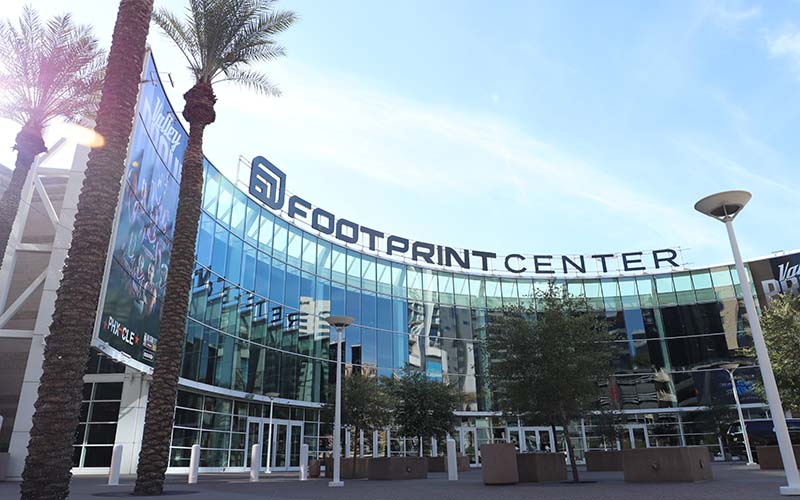
Beginning in the 2021-22 season, fans at Suns and Mercury games at Footprint Center saw plastic utensils and other concession items replaced with Footprint’s plant-based alternatives. (Photo by Wesley Johnson/Cronkite News)
Moving in the right direction
Through a partnership involving the City of Seattle, Oak View Partners and Amazon, the Climate Pledge Arena is the first carbon-neutral sports venue in the world. The venue runs completely on electric energy, uses recycled water, eliminates single-use plastics, sources food locally and donates waste to food banks and encourages spectators to use alternative modes of transportation.
“Obviously that’s the highest standard,” Barnes said.
Beginning in the 2021-22 season, fans at Suns and Mercury games at Footprint Center saw plastic utensils and other concession items replaced with Footprint’s plant-based alternatives. The arena will introduce more Footprint products and technologies over time.
The partnership also provides the Spanish soccer team Real Mallorca with consulting and sustainability products by Footprint.
Ed Olsen, a former general sales manager of Fox Sports Arizona, said, “It’s essential that the Phoenix Suns and Footprint find a way to forge a zero-waste event that others could point to.” Olsen is currently CEO of Line DriveSports Marketing and founder of ReThinc Advertising.
“The Phoenix Suns have always been a leader in sponsorship sales and in other business aspects that local teams have looked to emulate,” Olsen said. “So the Suns have a big responsibility to not only accomplish the goals that they have put forth with this partnership, but also to make sure those are shared with other sports teams in the marketplace – both in Phoenix and beyond.”
The partnership will influence not only the community, but also the planet, Olsen said.
On an international scale, the United Nations Framework Convention on Climate Change (UNFCCC) launched a Race to Zero campaign in June 2020, with the goal of reaching net zero carbon emissions by 2040 and a 50% reduction in greenhouse gasses by 2030. More than 280 sports federations, including global soccer governing body FIFA, men’s tennis’ ATP and the International Ski Federation have joined the cause.
Pierri, an EcoAthletes Champion, presented on behalf of EcoAthletes at the 2021 United Nations Climate Change conference (COP26) held in Glasgow, Scotland. It was the biggest climate summit to take place since the Paris Agreement was signed in 2015.
Pierri and Joe Cook, a cricketer, presented the sports manifesto, a document discussing the four key points that athletes wanted to see happen at the conference based on science-based strategies.
The four key points were: Secure global net-zero emissions by 2050 and limit global warning to 1.5 degrees Celsius; adapt to protect communities and natural habitats; and collaborate to finalize the Paris rulebook and mobilize finance to deliver these points.

